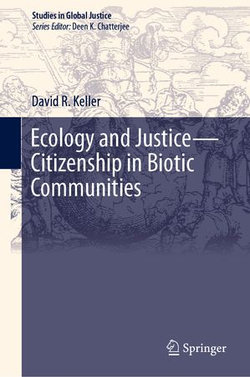
-
Books
-
Education
-
eBooks
-
Audio Books
-
Film & TV
-
Calendars, Diaries & Stationery
-
Giftshop

This is the first book to outline a basic philosophy of ecology using the standard categories of academic philosophy: metaphysics, axiology, epistemology, aesthetics, ethics, and political philosophy. The problems of global justice invariably involve ecological factors. Yet the science of ecology… more
This is the first book to outline a basic philosophy of ecology using the standard categories of academic philosophy: metaphysics, axiology, epistemology, aesthetics, ethics, and political philosophy. The problems of global justice invariably involve ecological factors. Yet the science of ecology is itself imbued with philosophical questions. Therefore, studies in ecological justice, the sub-discipline of global justice that relates to the interaction of human and natural systems, should be preceded by the study of the philosophy of ecology. This book enables the reader to access a philosophy of ecology and shows how this philosophy is inherently normative and provides tools for securing ecological justice. The moral philosophy of ecology directly addresses the root cause of ecological and environmental injustice: the violation of fundamental human rights caused by the inequitable distribution of the benefits (economies) and costs (diseconomies) of industrialism. Philosophy of ecology thus has implications for human rights, pollution, poverty, unequal access to resources, sustainability, consumerism, land use, biodiversity, industrialization, energy policy, and other issues of social and global justice. This book offers an historical and interdisciplinary exegesis. The analysis is situated in the context of the Western intellectual tradition, and includes great thinkers in the history of ecological thinking in the West from the natural sciences, social sciences and humanities.
Keller asks the big questions and surveys answers with remarkable detail. Here is an insightful analysis of contemporary, classical, and ancient thought, alike in the ecological sciences, the humanities, and economics, the roots and fruits of our concepts of nature and of being in the world. Keller is unexcelled in bridging the is/ought gap, bridging nature and culture, and in celebrating the richness oflife, its pattern, process, and creativity on our wonderland Earth.
Holmes Rolston, III
University Distinguished Professor, Colorado State University
Author of A New Environmental Ethics: The Next Millennium for Life on Earth (2012)
Mentored by renowned ecologist Frank Golley and renowned philosopher Frederick Ferré, David Keller is well prepared to provide a deep history and a sweeping synthesis of the "idea of ecology"—including the metaphysical, epistemological, and ethical aspects of that idea, as well as the scientific.
J. Baird Callicott
University Distinguished Research Professor, University of North Texas
Author of Thinking Like a Planet: The Land Ethic and the Earth Ethic (2013)
This item is delivered digitally
Thanks for reviewing Ecology and Justice—Citizenship in Biotic Communities. We will process your review. Accepted reviews will be posted within 3-7 business days.
Be the first to know, stay up to date with what's trending and get staff picks in your inbox with our newsletter


Public: Allow anyone to view or shop your List
Private: No one can view or shop your List
We have kept your A&R details for your new Angus & Robertson account
We also noticed that you have previously shopped at Bookworld. Would you like us to keep your Bookworld order history?
We also noticed that you have an account on Bookworld. Would you like us to keep your Bookworld details, including delivery addresses, order history and citizenship information?
Share This eBook